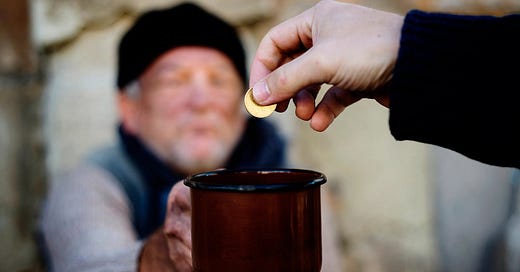Friends, one of the worst things we can do in the world is show God we are undeserving. God bestows upon us so much goodness, even though we are not always aware of that.
I was thinking of this recently when a young man came into my minyan asking for Tzedakah to help with a project in Israel I knew nothing about. The young man seemed earnest enough, so I decided to give a small donation.
And then there was the critic in my head, “Who is he? Maybe he’s not who he says he is.”
I fought back against the inner selfish critic and gave.
People ask us for help all the time. Yetzer Hara, the opposing force of the universe, stands by our side and tells us many things to prevent us from opening our hands and giving.
“Is that person really deserving? Don’t be a putz! They are just a lazy shnorrer!”
“Is this my problem? Isn’t that what the Jewish Federation, the Jewish Free Loan, the Jewish Family Service, the National Council of Jewish Women, the Jewish Veterans Association, the ADL, the AJC, the rabbi, the synagogue, etc, don't they help? Why am I the one that is supposed to help this person?”
“I worked hard for this money, and will I just give it away?”
“I have bills and mouths to feed, too! If I give to all these people or causes, how will I have enough for my family?”
The Yetzer Hara is so clever that it will come up with better — and better — reasons of why you should not help that person or that cause.
Sometimes, the Yetzer Hara arrives via something that a friend tells us.
They comment on something, “You gave to them? Well, I heard that they are not a great person; they brought this all on themselves…”
The friend now permits us to ignore the needy person's request because we have “proof” that they are undeserving.
“You give to that organization? A friend had a bad experience there, so I would never give to them.”
“You give already to Tomchei Shabbos; do you have to give to all the groups that claim to help the poor?”
The well-meaning friend becomes an agent of the Yetzer Hara, or worse.
The sages explain that the mitzvah to erase Amalek still exists today because we must purge that little bit of Amalek in all of us. Amalek was the ultimate doubter and cynic who cooled off our excitement for Torah and Godliness.
And Amalek still dwells in the universe and inside each of us, and we are supposed to fight against that nature.
Why am I discussing this now? What does being generous have to do with Kislev, December, Parsha VaYetzei?
Because we are nearing Chanukah and the darkest times of the year, the power of the klipa and the opposing forces are stronger now than during the summer. Materialism is everywhere, affecting us no matter what we try to do to keep it out.
We may be less likely to be generous, less likely to be swayed by our hearts to do good, to help those in need, and to support essential organizations and institutions.
In fact, the mitzvah of Tzedakah is one of the most essential and overlooked parts of Chanukah. The sages explain just how important it is to give tzedakah on Chanukah and the power that tzedakah has to transform wrongdoing into merits. 1
Additionally, one of the biggest tragedies that can occur when we close our hands and decide not to give is that God may decide that we are not deserving.
We are so busy evaluating whether someone is deserving or not that we may decide they are not deserving, and then God looks upon us and asks the same question.
Who says that we are deserving?
If we demonstrate that we are deserving by being generous and open-handed, then God, too, will be open-handed and generous with us.
May God grant us the strength to give and be generous, and in the merit of the tzedakah we give, the goodness that tzedakah creates will radiate out and uplift and illuminate the world in these darker times.
“On Chanukah you should give charity generously, for the days of Chanukah are auspicious to correct flaws of the soul through the giving of charity, *It has always been a custom for the poor to ask for charity during the days of Chanukah. (Mishnah Berurah 670:1) especially when it is given to support poor, Torah scholars.” - Kitzur Shulchan Aruch 139:1




